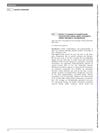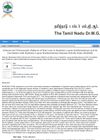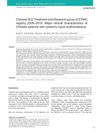 February 2021 in “Indonesian Journal of Perinatology”
February 2021 in “Indonesian Journal of Perinatology” Most pregnancies with SLE resulted in intrauterine growth restriction (IUGR).
November 2020 in “Research Square (Research Square)” Chronic scarring alopecia is common in SLE patients and needs early detection and management.
 March 2020 in “Poster presentations”
March 2020 in “Poster presentations” Accurate diagnosis of SLE requires extensive testing due to its complex symptoms.
Certain KIR genes in Indian SLE patients are linked to disease severity and could be biomarkers.
May 2018 in “The Journal of Immunology” A(1-7) treatment reduces symptoms of lupus in mice.

Hair loss in SLE patients is mostly due to chronic telogen effluvium and is linked to moderate disease activity.
June 2016 in “Annals of the Rheumatic Diseases” Early symptoms of SLE include fatigue, joint pain, and sensitivity to sunlight.
June 2013 in “Annals of the Rheumatic Diseases” Specialist nurses play a crucial role in managing lupus and empowering patients.
January 2011 in “Liaoning Zhongyiyao Daxue xuebao” The traditional Chinese medicine treatment improved symptoms and was more effective for SLE patients.
 March 2004 in “Journal of The American Academy of Dermatology”
March 2004 in “Journal of The American Academy of Dermatology” Women with lupus experienced non-scarring hair loss with fewer hair follicles, and the test for lupus in hair was not helpful.

Drinking sweetened tea and soda and poor sleep may increase the risk of hair loss in women.

Drinking sweetened tea and poor sleep habits may increase the risk of hair loss in women.

Drinking sweetened tea and poor sleep increase the risk of hair loss in women.

Sleep may mediate the link between sugary drinks and female hair loss.
December 2022 in “Journal of Sulaimani Medical College” Sleeve gastrectomy leads to significant weight loss and health improvements with few complications.
Taking supplements after sleeve gastrectomy surgery can reduce hair loss by addressing nutritional deficiencies.

Some drugs may increase the risk of obstructive sleep apnea, while others like certain biologics might decrease it.
 June 2016 in “CRC Press eBooks”
June 2016 in “CRC Press eBooks” Sleep problems and skin issues affect each other; poor sleep can worsen skin conditions, and some skin treatments can improve or harm sleep quality.
 October 2007 in “Current Respiratory Medicine Reviews”
October 2007 in “Current Respiratory Medicine Reviews” Women with PCOS are much more likely to have sleep problems and should be checked for them.
 105 citations,
February 2011 in “The Journal of Clinical Endocrinology & Metabolism”
105 citations,
February 2011 in “The Journal of Clinical Endocrinology & Metabolism” Treating sleep apnea in young obese women with PCOS can improve heart health and insulin sensitivity.
66 citations,
March 1998 in “Mayo Clinic Proceedings” Removing a testosterone-producing tumor cured a woman's sleep apnea and other symptoms.
 62 citations,
July 2017 in “Endocrine connections”
62 citations,
July 2017 in “Endocrine connections” Adults with polycystic ovary syndrome are much more likely to have obstructive sleep apnea.
 53 citations,
January 2012 in “Fertility and Sterility”
53 citations,
January 2012 in “Fertility and Sterility” Women with PCOS are more likely to have sleep apnea, mainly if they are obese.
16 citations,
January 2014 in “Obesity surgery” Vertical sleeve gastrectomy improved metabolism, behavior, and reproduction in obese rats with PCOS.
 15 citations,
March 2021 in “Rheumatology and Immunology Research”
15 citations,
March 2021 in “Rheumatology and Immunology Research” Chinese patients with systemic lupus erythematosus commonly experience oral ulcers, arthritis, alopecia, skin rash, and nephritis.
13 citations,
July 2018 in “Obesity surgery” Over half of patients had hair loss after weight-loss surgery, especially women, linked to low zinc and vitamin B12 levels.
9 citations,
June 2013 in “Journal of Cosmetic Dermatology” Lateral oblique forehead lines are caused by muscle movement, not sleep positions, and can be treated with botulinum toxin A.
 6 citations,
January 2021 in “Journal of Cosmetic Dermatology”
6 citations,
January 2021 in “Journal of Cosmetic Dermatology” Poor sleep during the pandemic may increase stress and worsen hair loss conditions.
 5 citations,
August 2018 in “International Journal of Dermatology”
5 citations,
August 2018 in “International Journal of Dermatology” Men with sleep apnea and low iron levels are more likely to have male-pattern baldness, especially if they have a family history of hair loss.
 4 citations,
February 2022 in “The Journal of Urology”
4 citations,
February 2022 in “The Journal of Urology” Poor sleep, physical health, depression, and anxiety can worsen urinary problems in men.


















